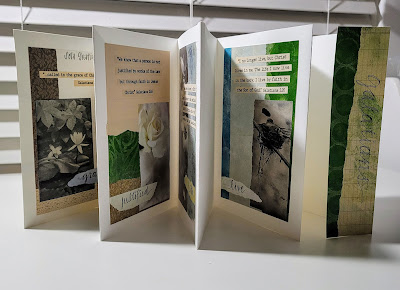Galatians Words Introduction
Tomorrow, we begin the Galatians Words Challenge! Today I
would like to give a bit of the background for Paul’s letter to the Galatian
churches, offer a few study tips, and explain the format for this Words
Challenge. This post is a bit long, but I promise the challenge posts will not be so long.
First, let’s look at the format as I have changed it a bit
for this Words Challenge based on feedback from past challenges. Beginning
tomorrow I will post a Bible study devotion on my blog for the first word. From
there I will post each word and Bible study devotion every other day. The day
in between posts is a day for you to study and make art if you choose. At the
end of each post, I’ll give you some suggestions for studying for the next word.
You will get so much more out of this challenge if you participate in studying
yourself before reading my posts about what I saw in the study. Remember that I
will be using a new study tool, the ESV Scripture Journal for Galatians. I
posted a few days ago about how I added extra note pages. You can read that here. You can click on the
picture below to be taken to Amazon to purchase a Scripture Journal.
Now, let’s look at some background information about Paul’s
letter to the Galatian churches. This letter is thought to be one of his earlier letters, probably written after 1 & 2 Thessalonians.
The book of Acts tells us the story of how the Galatian territories, and other Gentile areas, heard the gospel of Christ and then formed churches. I am going to make this a quick overview but will provide Scripture references if you would like to read the full story.
- The book of Acts begins after Jesus' resurrection and the forty days he spent among his disciples. In Acts 1:8 Jesus says his final words to his followers telling them, "You will receive power when the Holy Spirit comes upon you; and you will be my witnesses in Jerusalem, and in all Judea and Samaria, and to the ends of the earth." The rest of the book of Acts tells the story of how this took place,
- Acts 2:1-13 tells the story of the day of Pentecost when the Holy Spirit comes upon Jesus' followers. This follows with a great gospel presentation from Peter in 2:14-41. In this presentation, Peter shares how the coming of the Holy Spirit fulfills the Old Testament prophecies of the New Covenant in Ezekiel 36:26-27 and Joel 2:28-32. God promised to put His Spirit in His people, enabling them to live His ways. He would pour out His Spirit on His people.
- As we continue through the book of Acts, we begin to see the story of the Gospel of Christ spreading throughout Jerusalem, Jude and Samaria as Jesus foretold. But at this time, it is mainly spread through the Jewish synagogues and populations to the Jewish people. That is until we reach Acts 9.
- In Acts 9:1-18 we read the story of a man named Saul who was Jewish and a member of the Pharisees. Scripture tells us that his job was to persecute those who were turning to faith in Christ. But this wonderful story in Acts 9 shares how Saul himself meets the Risen Christ and he becomes a Christ-follower as well. We read in 9:15 that the Lord "has chosen this man as my instrument to carry my name before the Gentiles..."
- And so, begins the story of how Saul becomes the Apostle Paul and takes the Gospel of Christ to the Gentile nations, which will lead to it being spread to "the ends of the earth". This is the story of the book of Acts; the Gospel spreads to the Gentile nations and local congregations are born.
- In Acts 13 and 14. Saul and Barnabas take their first missionary journey. They begin in Antioch, sail to the island of Cyprus, then continue to the regions of Asia Minor which included the Galatian region. On this journey Paul preaches in syagagues but begins to face persecution from the Jewish people who see people turning to Christ as a threat to their religion's ways and to the synagogue's financial means. Part way through his journey after facing repeated threats and beatings, Saul states in 13:46-47 that the Jews rejection of the Gospel of Christ will now result in him "turning to the Gentiles...becoming a light for the Gentiles, to bring salvation to the ends of the earth." It is at this point in his journey that he travels to Galatia. It is also on this journey to Galatia that we begin to see Saul become known by his Gentile name, Paul.
- At each town where many Gentiles came to faith in Christ, Paul would teach them and train elders, and a local church would be established to continue their spiritual growth in this new way of life and to continue the spread of the gospel in that town. Many of the New Testament letters were written by Paul to these churches he had established. He would receive reports back from the elders and respond with letters which would be read aloud and taught to the congregations. These letters would contain theology of the gospel, instruction on how to live as God's people, and would often address solutions to specific problems that the local churches were facing. Our job in the 21st century is to learn about the problems and challenges the 1st century churches faced and then apply them to the situations we face today.
Sola gratia, sola fide, solus Christus.
Which is Latin for by grace alone though faith alone in Christ alone. Our journey through Galatians will reveal the heart of Paul for the gospel of grace.
 |
| Click on photo to download a printable version |







No comments:
Post a Comment